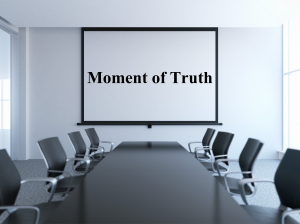Methane rollbacks create moment of truth for oil and gas executives
 How top energy companies engage in the U.S. methane policy debate in the coming weeks may tell us a lot about the future of natural gas.
How top energy companies engage in the U.S. methane policy debate in the coming weeks may tell us a lot about the future of natural gas.
As these companies have themselves recognized, the role of natural gas in a world that can—and must—decarbonize depends on minimizing harmful emissions of methane from across oil and gas production and the natural gas value chain. But a recent comprehensive study involving dozens of leading academics and companies around the country found that U.S. methane emissions from industry are 60 percent higher than prior estimates—enough to double the climate impact of natural gas.
Such wasteful emissions leak away the potential climate benefits of natural gas, threatening the credibility of executives making the case to institutional investors and society that natural gas can meet what some industry leaders have deemed the “dual challenge” of meeting energy demand while reducing emissions.
Industry leaders are moving forward by setting methane targets and implementing technologies to meet them. But despite the importance of preserving cost-effective methane rules that level the playing field, the Trump Administration now seeks to weaken, then eliminate nationwide methane regulation in the world’s largest oil and natural gas producing nation.
The Environmental Protection Agency (EPA) proposed a rule change that would dramatically weaken standards that require regular inspection and repair of leaks at oil and gas facilities. EPA is also said to be mulling a second proposal that would eliminate methane rules entirely, leaving only a weakened rule for volatile organic compounds in its place. This appears to be part of a larger strategy to not only weaken the current rules but to prevent future regulation of existing sources—a strategy that, if successful, would make it nearly impossible to effectively tackle the 13 million tons of methane the oil and gas industry emits annually in the U.S.
Now, all eyes turn to the reactions of energy companies with the incentive—and ability—to make their voices heard in opposing deregulation that harms the environment and future of gas.
The intricacies of methane regulations are complicated, but the core issue for industry is not: Will companies positioning themselves as leaders support effective regulation of methane emissions, or stand by as rules are weakened and ultimately dismantled?
Five reasons industry should defend federal methane regulation
Companies should defy cynics and engage actively and responsibly in the public debate, supporting sound direct methane regulation across the supply chain.
First, undoing methane regulation will further weaken the increasingly fragile environmental reputation of natural gas—a risky proposition for an industry that knows societal trust and investor confidence are essential but very much in question. The combined effect of the two EPA rollbacks would be to reduce the U.S. industry’s methane emissions by no more than about three percent—a far cry from what is feasible and needed to address legitimate stakeholder concerns about the role of gas in a cleaner energy future.
Second, companies like BP, Chevron, Equinor (formerly Statoil), ExxonMobil, and Shell publicly committed just last year to “advocate sound policy and regulations on methane emissions” as one of five “guiding principles” to address methane emissions across the value chain and around the world. In making this important commitment, the signatories also agreed to “work constructively” with governments and non-profits on development and implementation of “effective methane abatement policies or regulations.” Vocal support for maintaining reasonable federal methane regulation would show progress in meeting prior commitments, whereas staying silent would jeopardize the integrity of these commitments.
Third, the EPA rule has been in effect for all sources for over a year (and for some sources, more than two years). Most operators are readily complying by adopting cost-effective strategies like searching for leaks twice a year and avoiding outdated equipment that vents gas to the atmosphere. For example, Shell’s recently retired Executive Vice President, Greg Guidry, recently noted that “most of the things we’ve done have actually been more commercial than we thought.” There are over 100 leak detection and repair (LDAR) companies located in the U.S., who provide efficient and cost-effective services to industry, and help keep natural gas in the pipe. Savvy operators understand that while methane controls are not costless, they are cost justified and simply good business practice to boot. It’s no time to turn back now.
Fourth, pushing back against deregulatory overreach is good risk management. If industry encourages or acquiesces to reckless rollbacks today, when the political pendulum in Washington inevitably swings back, industry could well face a much more challenging set of rules as policymakers struggle to “make up for lost time.”
Methane emissions may be invisible, but corporate leadership is not. As executives decide how to engage in the methane policy debate, the world is watching.
Lastly, industry has ample ability and opportunity to weigh in on tweaking nationwide methane regulations, reforming them in a credible and workable manner, without dismantling them. Thoughtful, solutions-oriented industry voices can help EPA’s new political leadership put down the axe and instead improve elements of the methane regulation that could work better for industry, without compromising the environmental benefits of the original rule.
XTO Energy President Sara Ortwein acknowledged that “there should be a cost-effective federal regulatory standard to manage methane emissions for both new and existing source oil and gas facilities.” As EPA prepares to unwind America’s only broadly applicable nationwide methane regulation, companies like hers must intervene throughout the fall, advocating pragmatism over absolutism and supporting an effective methane regulatory effort consistent with a key area of climate change science.
Methane emissions may be invisible, but corporate leadership is not. As executives decide how to engage in the methane policy debate, the world is watching.
Methane rollbacks create moment of truth for oil and gas executives Share on X










